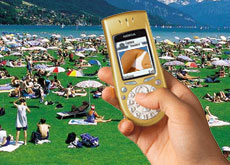Photo phones spark privacy fears

Zurich has banned visitors to the city's public swimming pools from using mobile phones to photograph other bathers.
Experts fear that photos taken by mobile phone users can be quickly uploaded to sites on the Internet.
“Some people are very creative, coming up with ways of using a technology which was not necessarily dreamt up by those who invented it,” says Kesia Trench, a sociologist at Zurich University and author of an ongoing study into the use of mobile phones by young people.
The authorities in other Swiss cities are monitoring public reaction to the Zurich ban.
A seasonal rise in the number of people flocking to the city’s public pools to cool off has raised concerns about the new generation of mobile phones with Multimedia Message Service (MMS) capabilities.
“We want to protect our visitors,” says Hermann Schumacher, head of public baths at Zurich’s sports authority.
“The pools are a sensitive place and we prefer to take preventive measures. The debate was sparked by a similar ban imposed by fitness clubs in the city, which first brought this problem to our attention,” he explains.
Restricted ban
The ban will only apply to those who secretly attempt to take photos of strangers.
Those wishing to immortalise their trip to the poolside with family or friends can still use MMS mobiles or ordinary cameras.
But those who repeatedly try to snap bathers without the subject’s permission may be hit with a poolside ban.
Poolside staff will not specifically watch out for people using mobile phones to take pictures, but urge anyone who becomes an unwitting target of a secret snapper to inform them.
No complaints have so far been made, and Zurich’s pools have yet to ban an MMS user.
Data protection
Thomas Bärlocher, a data protection official in Zurich, welcomes the initiative to crack down on the illicit use of MMS.
“The pools have every reason to take this preventative action,” he says, “and unlike the use of closed-circuit television, taking such a step does not pose any legal problem at all.”
The ban is in line with data protection laws, which recognise the right to personal privacy.
But those in charge of swimming pools in French-speaking Switzerland seem – for the moment at least – reluctant to follow their counterparts in Zurich.
Monitoring developments
“The problem has never arisen, but of course we cannot say that that will always be the case,” says Jean-Paul Gaillard, deputy head of Lausanne’s sports authority.
“We will watch to see how the issue evolves before deciding whether to ban [these phones].”
“We will carefully monitor the use of MMS at pools,” adds Gaillard’s counterpart in Sion, Ignace Bichet. “Cameras are already banned, but we have not yet been confronted with the issue of MMS.”
Swisscom – Switzerland’s main telecommunications operator – says the number of people using MMS continues to rise.
“MMS was introduced in May 2002 and today we have 150,000 users – 100,000 of those use the technology regularly,” says Swisscom spokesman, Christian Neuhaus.
swissinfo, Ariane Gigon Bormann, Zurich (translation: Samantha Tonkin)
MMS stands for Multimedia Message Service.
More than 150,000 people send MMS messages in Switzerland every day.
MMS was introduced in May 2002.

In compliance with the JTI standards
More: SWI swissinfo.ch certified by the Journalism Trust Initiative
You can find an overview of ongoing debates with our journalists here. Please join us!
If you want to start a conversation about a topic raised in this article or want to report factual errors, email us at english@swissinfo.ch.